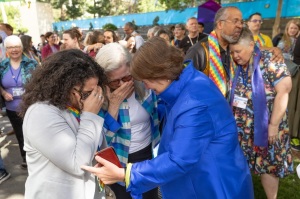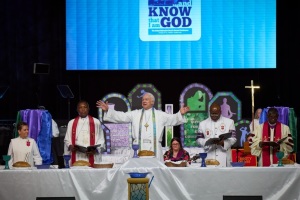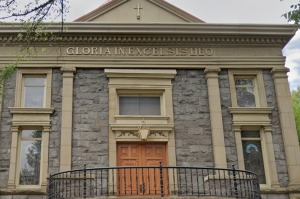Anti-Homosexuality Activists Have Freedom to Distribute Fliers on College Campus, Federal Court Rules
A federal court in Illinois has ordered a community college to allow two activists to distribute anti-homosexuality leaflets on its campus, after the school maintained that the individuals could not distribute such materials that were deemed "inconsistent with the philosophy, goals and mission of the college."
Last January, Wayne Lela and John McCartney sent an application to Waubonsee Community College seeking permission to pass out leaflets on its campus promoting their Heterosexuals Organized for a Moral Environment, a group organized by Lela that advocates that homosexuality is immoral. After submitting the required details about the leaflets to the administration, the administration sent them back a letter denying their request later that month.
Although Lela and McCartney had been previously granted permission in 2003 and 2005 to pass out the promotional items for the organization on the WCC campus, the school's letter of denial in January of 2014 stated that group's message conflicted with the message of the school and that school could not allow them to hand out their leaflets on its campus.
The heterosexual group condemns homosexual behavior and produces publications like, "The Uncensored Truth about Homosexuality." They filed a court motion in late July stating that they had protections under the First Amendment of the Constitution.
Lela and McCartney sought a preliminary injunction that would allow them to pass out flyers, no matter how their beliefs contrasted with the beliefs of the college.
Last week, Judge Robert Gentleman of the U.S. District Court issued the injunction ruling that the school does not have the right to discriminate based on the content of speech.
"First Amendment rights cannot be vetoed by listeners who, in disapproving of the message, create a disturbance, thereby silencing the speaker," the judge wrote in his decision. "[The] Defendant's concern that plaintiff's presence on campus may cause a negative student response or disturbance was not a constitutional ground for denying them access."
Because Judge Gentleman felt that the merits of Lela and McCartney's case were strong enough, he had no trouble issuing the preliminary injunction. The injunction states that the school, which is located in Sugar Grove, must allow Lela and McCartney to pass out their leaflets. WCC must submit a reasonable time period to the court for when the two individuals will be allowed to start leafleting on the campus by Jan. 26.
"As has been held numerous times by courts in this district, the loss or impingement of freedoms protected by the First Amendment, 'even for minimal periods of time, unquestionably constitutes irreparable injury,'" Gentleman wrote. "Given the court's finding that defendant discriminated against plaintiffs based on the content of their speech, the court finds that plaintiffs have a high likelihood of success on the merits."
Lela and McCartney were represented by The Rutherford Institute, a legal group devoted to the protecting civil liberties. President of The Rutherford Institute, John Whitehead, said in a statement that university campuses once served as a breeding ground for ideas but now schools are going out of the way to silence those who disagree with the school's opinions.
"We are pleased that the district court recognized the value of free speech, provocative or not, in our society," Whitehead wrote. "If college administrators today were allowed to have their way, college campuses would be little more than breeding grounds for compliant citizens content to speak only when spoken to, on politically correct topics guaranteed not to cause disruption or disagreement, and in Orwellian areas designated as free speech zones."
Assisting the Rutherford Institute in the case were two attorney's from the the Chicago-based Mauck & Baker, LLC., a legal group advocating for the "religious oppressed." Mauck & Baker attorney Whitman Brisky, who helped in the case, said in a statement that he hopes there will be more court cases in the future to help eliminate the censorship by universities and colleges.
"Colleges in America should not be in the business of protecting their students from ideas and suppressing speech," Brisky said. "We need more cases and judicial decisions like this to beat back the increasing levels of censorship on our college campuses."
In December, Marquette University in Wisconsin suspended a tenured professor after he blogged about his opposition to a teaching instructor who prohibited a student from discussing his views against same-sex marriage. It was reported earlier in December that Marquette University had also been training its faculty to report any other faculty member who voices opposition to same-sex marriage as as form of harassment.




























